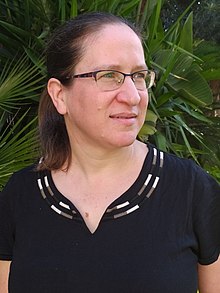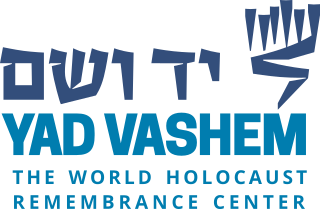
Yad Vashem is Israel's official memorial to the victims of the Holocaust. It is dedicated to preserving the memory of the Jews who were murdered; echoing the stories of the survivors; honoring Jews who fought against their Nazi oppressors and gentiles who selflessly aided Jews in need; and researching the phenomenon of the Holocaust in particular and genocide in general, with the aim of avoiding such events in the future. Yad Vashem's vision, as stated on its website, is: "To lead the documentation, research, education and commemoration of the Holocaust, and to convey the chronicles of this singular Jewish and human event to every person in Israel, to the Jewish people, and to every significant and relevant audience worldwide."

Righteous Among the Nations is an honorific used by the State of Israel to describe non-Jews who risked their lives during the Holocaust to save Jews from extermination by the Nazis for altruistic reasons. The term originates with the concept of "righteous gentiles", a term used in rabbinic Judaism to refer to non-Jews, called ger toshav, who abide by the Seven Laws of Noah.
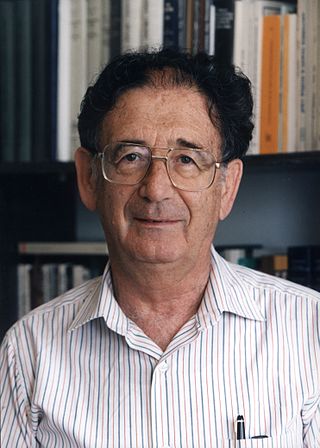
Yehuda Bauer is a Czech-born Israeli historian and scholar of the Holocaust. He is a professor of Holocaust Studies at the Avraham Harman Institute of Contemporary Jewry at the Hebrew University of Jerusalem.

The International Holocaust Remembrance Day, or the International Day in Memory of the Victims of the Holocaust, is an international memorial day on 27 January that commemorates the victims of the Holocaust, which resulted in the genocide of one third of the Jewish people, along with countless members of other minorities by Nazi Germany between 1933 and 1945, an attempt to implement its "final solution" to the Jewish question. 27 January was chosen to commemorate the date when the Auschwitz concentration camp was liberated by the Red Army in 1945.

Rut "Rutka" Laskier was a Jewish Polish diarist who is best known for her 1943 diary chronicling the three months of her life during the Holocaust in Poland. She was murdered at Auschwitz concentration camp in 1943 at the age of fourteen. Her manuscript, authenticated by Holocaust scholars and survivors, was published in the Polish language in early 2006. English and Hebrew translations were released the following year. It has been compared to the diary of Anne Frank.

Israel Gutman was a Polish-born Israeli historian and a survivor of the Holocaust.
Joanna Beata Michlic is a Polish social and cultural historian specializing in Polish-Jewish history and the Holocaust in Poland. An honorary senior research associate at the Centre for Collective Violence, Holocaust and Genocide Studies at University College London (UCL), she focuses in particular on the collective memory of traumatic events, particularly as it relates to gender and childhood.

Radzanów is a village in Mława County, Masovian Voivodeship, in east-central Poland, approximately 28 kilometres (17 mi) south-west of Mława and 101 km (63 mi) north-west of Warsaw. It is the seat of the gmina called Gmina Radzanów.
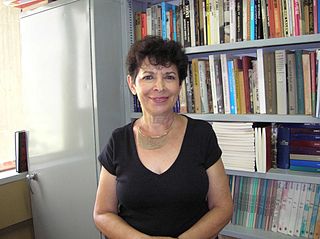
Dina Porat is an Israeli historian. She is professor emeritus of modern Jewish history at the Department of Jewish History at Tel Aviv University and the chief historian of Yad Vashem.
Yad Vashem, the state of Israel's official Holocaust memorial, has generally been critical of Pope Pius XII, the pope during The Holocaust. For decades, Pius XII has been nominated unsuccessfully for recognition as Righteous Among the Nations, an honor Yad Vashem confers on non-Jews who saved Jewish lives during the Holocaust altruistically and at risk to their own lives.
Holocaust studies, or sometimes Holocaust research, is a scholarly discipline that encompasses the historical research and study of the Holocaust. Institutions dedicated to Holocaust research investigate the multidisciplinary and interdisciplinary aspects of Holocaust methodology, demography, sociology, and psychology. It also covers the study of Nazi Germany, World War II, Jewish history, religion, Christian-Jewish relations, Holocaust theology, ethics, social responsibility, and genocide on a global scale. Exploring trauma, memories, and testimonies of the experiences of Holocaust survivors, human rights, international relations, Jewish life, Judaism, and Jewish identity in the post-Holocaust world are also covered in this type of research.
Livia Rothkirchen was a Czechoslovak-born Israeli historian and archivist. She was the author of several books about the Holocaust, including The Destruction of Slovak Jewry (1961), the first authoritative description of the deportation and murder of the Jews of Slovakia.
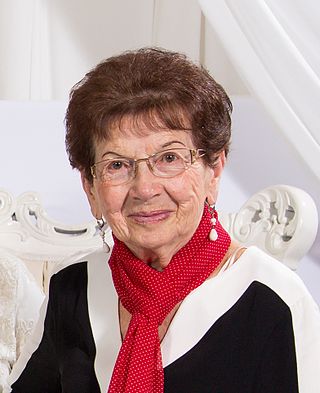
Bat-Sheva Dagan is a Polish-Israeli Holocaust survivor, educator, author, and speaker. Born in Łódź, Poland, she was incarcerated in a ghetto in Radom with her parents and two sisters in 1940. After her parents and a sister were deported and murdered in Treblinka in August 1942, she escaped to Germany, but was discovered, imprisoned, and deported to Auschwitz in May 1943. After spending 20 months in Auschwitz, she survived two death marches and was liberated by British troops in May 1945. She was the only survivor of her family. She and her husband settled in Israel, where she taught kindergarten and later obtained degrees in educational counseling and psychology. She went on to author books, poems, and songs for children and young adults on Holocaust themes, and developed psychological and pedagogical methods for teaching the Holocaust to children. She is considered a pioneer in children's Holocaust education.

Jan Zbigniew Grabowski is a Polish-Canadian professor of history at the University of Ottawa, specializing in Jewish–Polish relations in German-occupied Poland during World War II and the Holocaust in Poland.

Ewa Kurek is a Polish historian specializing in Polish-Jewish history during World War II. She has been associated with the far-right, and her revisionist views regarding the Holocaust in Poland have been widely categorized as indicative of antisemitism and Holocaust denial.
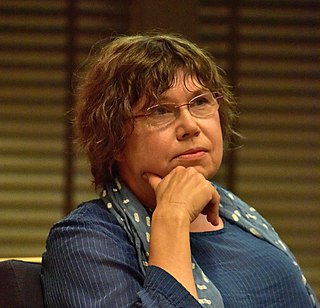
Barbara Engelking is a Polish psychologist and sociologist specializing in Holocaust studies. The founder and director of the Polish Center for Holocaust Research in Warsaw, she is the author or editor of several works on the Holocaust in Poland.
Shmuel Krakowski, Samuel Krakowski or Stefan Krakowski was an Israeli historian specializing in the Holocaust in Poland. After surviving the Holocaust, Krakowski worked for the intelligence and security services of the People's Republic of Poland. Later he became a Director of the Yad Vashem Archives in Israel.
Daniel Blatman is an Israeli historian, specializing in history of the Holocaust. Blatman is the head of the Institute for Contemporary Jewry at the Hebrew University of Jerusalem.
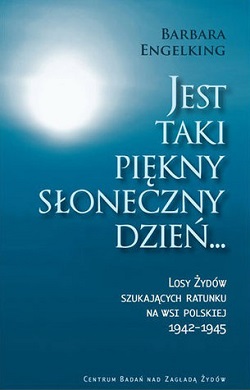
Such a Beautiful Sunny Day: Jews Seeking Refuge in the Polish Countryside, 1942–1945 is a 2016 book by Polish historian Barbara Engelking. It was first published in Polish in 2012 as Jest taki piękny, słoneczny dzień: Losy Żydów szukających ratunku na wsi polskiej 1942–1945. It focuses on the subject matter of The Holocaust in Poland.

Edward Mosberg was a Polish-American Holocaust survivor, educator, and philanthropist. During the Holocaust, he was held by the Nazis from 14 years of age in Kraków Ghetto, Kraków-Płaszów concentration camp, Auschwitz concentration camp, Mauthausen concentration camp, and a slave labor camp in Linz, Austria, that was liberated by the US Army in 1945. Nearly all of his family were murdered in the Holocaust.
